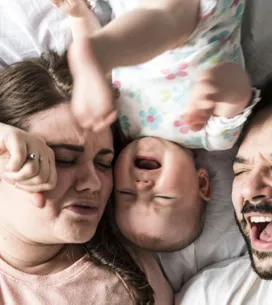Trying to conceive
We sat down with Emma Cannon, fertility expert and author of The Fertility Rooms: Total Fertility, to find out how to maximise your chances of having a baby.
1. Don't smoke
Sound obvious? Nuh uh. For most women quitting smoking only becomes a realisation once they've already fallen pregnant but the impact it has on your fertility starts long before then. As for your partner? They don't get away lightly either.
"Smoking accounts for 13% of the worlds infertility and ages you by 10 years in terms of fertility - it’s very easy when you are young to think that it won’t have an impact later on but it will.
"Smokers are 30 per cent less fertile than non-smokers, and three times more likely to take more than a year to get pregnant. Ovarian function can be affected, interfering with the release of an egg and the womb lining can become thinner over time. Smokers go into the menopause on average 3 years sooner than non-smokers and have lower fertilisation rates in IVF."
Make for a happier egg and sperm relationship by packing in the cigs. No 'butts'.
2. Consider acupuncture
Being probed with a bunch of needles might not sound all that relaxing but when you're trying for a baby you've gotta learn to give things a whirl.
Emma says acupuncture is great for improving pelvic blood flow and endometrial quality and moving stagnation in the pelvic region. It also has a regulating effect on the body. For that reason it is the number one choice of treatment for fertility.
She says, "Research has shown it to be effective in improving IVF outcome, stimulating ovulation in women who are not ovulating and improving menstrual pain.
"Acupuncture is also deeply relaxing and releases ‘feel-good’ endorphins. I recommend it for women and men who want to optimise their fertility, and also for couples going through IVF and for management of gynaecological conditions.
"It is always best to find a practitioner who will work along side your GP or consultant and one that is registered with the British Acupuncture Council."
3. Protect yourself
Looking after your sexual health sooner rather than later will help improve your chances of fertility. Emma explains, "It is estimated that a quarter of all fertility problems are caused by the effects of STD's. For example Chlamydia can lie completely undetected with no symptoms and end up blocking fallopian tubes if not diagnosed and treated early on.
"It is important to use barrier methods such as condoms until you are with a partner that you might want to have children with. This is the best way to protect yourself from STD's. Regular tests will mean that if you have contracted anything then you can get early treatment which might help treat a condition before it develops into something more serious."
4. Keep your BMI in check
And that doesn't just mean being overweight. A BMI that's too low impacts on your chances of fertility later on. Emma Recommends trying to incorporate regular exercise that you enjoy into your life and take a careful look at your diet.
"Avoid processed foods and sugar as much as possible and eat food as close to its natural state as you can. Obese women may have too much oestrogen due to too much body fat, which can contribute to fertility problems. Equally, low body fat can cause ovulation to completely stop."
5. Avoid sugar and limit alcohol
There is so much hidden sugar in our foods that sugar consumption is causing a multitude of health issues including fertility problems. Excess sugar in the diet tends to create too much Dampness in the body; this can lead to cysts forming and can impact of the regularity of ovulation.
"Each month an egg is released from the follicles that form on the ovary - this is ovulation. If the egg fails to release then not only do cysts form but conception is not possible. I believe that alcohol and sugar contribute to this problem.
"My advise is chose full fat organic products, avoid sugar as much as possible and limit alcohol making sure you have eaten before you drink (this causes less disruption to the hormones)."
6. Know your ovulation
This is the time when your chances of getting pregnant are highest. It is generally around the 14th day after the start of your period. You can pinpoint it by measuring your temperature throughout your cycle as body temperature is higher just after ovulation.
Ovulation tests can also help, and are available in chemists. The advantages of these tests is that they tell you your ovulation day 1 or 2 days in advance so you can prepare for it. They are based on the concentration of hormones present in urine and are 96% reliable.
7. Have sex
Can certain positions improve your chances of falling pregnant? Or does it just come down to having fun and keeping your sex life as normal (and exciting) as possible? I.e. no mention of the B word. Emma helps to spell it out:
"Lots of people ask about sexual positions and which one is more likely to result in pregnancy, the answer is that there isn’t actually any conclusive evidence to promote one position over another.
"Sex can easily become a point of contention in couples trying to conceive and stress has shown to reduce libido. So my advise to couples is to have sex in whichever position you like best as the more fun and enjoyment you have the more sex you will have which is all good on the fertility front.
"Of course everyone has different anatomy and some women do have cervix which are positioned differently so these women (if they have this information), may need to adjust their sexual position in order to optimise the chances of the sperm passing the cervix and reaching the egg.
"Some people advocate tipping the pelvis by placing a pillow under the bottom. In terms of frequency of sex; every other day from day 8 to day 16 in a 28 day cycle is ideal. Don’t rely on kit and sticks to pin point sex as our research demonstrates that couples who habitually do this reduce the amount of sex they have by 1/3 when compared to couple who do not rely on kits."
Take the pressure off and focus on the intimacy instead!
8. Know your seasons
It sounds bizarre on first hearing but fertility changes according to season. More sperm is produced at the beginning of spring and end of autumn. Sperm is more mobile at the end of summer and beginning of autumn. So it would seem that autumn and the beginning of winter are the best times for conception for men.
9. Be aware of your medication
Certain antalgics, such as non-steroid anti-inflammatory medications, affect the prostaglandin hormones that contract the uterus. See your GP, but it's best not to take them during ovulation.
10. And relax!
Stress, anxiety and fear of 'failure' are equally valid reasons for conception problems! Let go and let nature take its course. If you've just come off the pill, listen to your body and let your body find its natural rhythm again. Ask yourself if there could be an unconscious psychological block in the way, and if so get help.
Emma's new book Fertility to Family is now available to purchase. Get your copy here for £9.99.
And of course you're going to need some sexy positions to help too! Check these out for inspiration. ..

Maybe you've tried, tested and been successful? Tweet us your tips for trying to conceive @sofeminineUK
You might also like:













